Billie and Mac
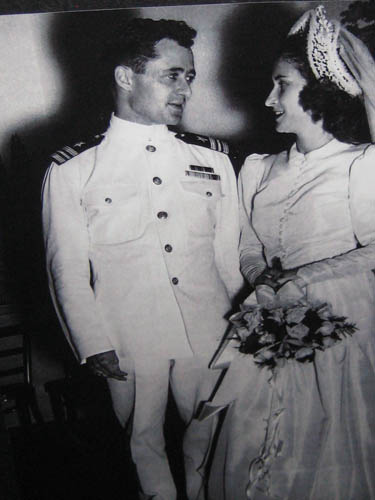
(Billie and Mac at their wedding, shortly after the end of WWII. Photo Mac Showers).
I appear to have made it to Friday. I think I did. I got up early because I went down early, once dinner was done and the dishes cleaned up. I was going “to read” in bed and that did not seem practical once the old gray head hit the pillow. I was out before nine, I think.
I did not mind the early surrender to the arms of Morpheus since the pop-up meeting in Tysons this morning advertised a buffet breakfast at eight, meeting starting at nine.
I am good for one trip to Tysons per day, and was resigned to showing up late for the breakfast, sit through the meeting and escape back to Arlington some time before lunch to start digging out.
That of course would shoot the rest of the day, and I had hoped to knock out the tribute issue of the semi-annual Quarterly (I know, I know, why a two-a-year for a four-a-year schedule) after the working day is done.
It has been hard. I have a large picture of Mac’s wife Billie on the computer. She is a hypnotic beauty, and when I look down from the words on the screen, there she is, nearly big as life.

(The photo of the lovely Billie that is haunting me this week. Photo Mac Showers).
I never met Billie, but I am sure I would have liked her. She passed a decade, around the time Mac and I struck up our mutual admiration society, and she had been suffering from the ravages of dementia for twenty years before that. She had been institutionalized at the Lutheran Home in the early 1990s, which is when Mac really launched his third career as a volunteer to help people dealing with the two things that he had: Alzheimers and Cancer.
Anyway, she isn’t accusing me of anything with those lovely sloe eyes, but she is reminding me I have to get on with it and get the issue done.
Plowing through the morning stuff I saw a couple notes from the Left Coast from the Macaroon Lady. She is a bit of a mystic. I have friends who are into the Shaman movement, channeling dreams and portents, and given the year this has been, have been refining my ideas about the Great Interface between being here and not being here.
The peculiar circumstance of my parent’s coincident departure earlier this year is a case in point, as is Mac’s own decision to leave: it was a conscious decision to take the long dark train out of town. The Macaroon Lady is on a mission, and it is to discover a trove of messages and logs from the Big War that would change our interpretation of it completely, at least in her view.
I am familiar with causes- one of Mac’s last one’s was to secure the award of the Distinguished Service Medal to Joe Rochefort, the code-breaker whose medal after the Battle of Midway was denied by a cabal of ambitious careerists back in Washington, who stole the credit for his brilliant analysis of Japanese intentions. Acting on Joe’s recommendations, Fleet Admiral Nimitz threw everything he had at the Japs.
“Fortuna audaces iuvat,” goes the old Roman quote. Fortune favors the bold.
Another cause was the one that fixated the late Admiral Rex. He was determined to make a significant memorial to the only Intelligence professional to be captured and executed by the Viet Cong, CDR “Jack” Graf. Rex accomplished his mission before he left.
The Macaroon Lady’s quest is to discover the missing files that would prove that some of the ‘heroes” of World War II were in fact scoundrels, bounders and cheats. She is very determined, and I think she may crack the case, even at this distance in space and time., and I wish her well.
Anyway, that is how she came to know Mac, the last man around who actually knew what happened. He was happy to answer her questions. She wrote me overnight and said that Mac was appearing to her in dreams.
Here is how she put it:
“In the dream, Mac and I were laughing away so much that tears were coming out of our eyes, and as I realized that I was retuning to the land -of -the- living, Mac looked at me and said, “Tell Vic…????”… which I still can’t remember a day later, but it was interesting info about this WWII stuff, as I went “Really?!” to Mac, and then woke up to the California dark. I am concentrating on Mac to send me another dream…it helps if there is a photo of him in the room, as he will zero in through that energy (why Native American medicine people like the legendary Crazy Horse of the Lakota Sioux never wanted his photo taken, as it captures energy)…Mac knew that I sometimes get interesting info in my dreams, that he was able verify..so hopefully there will be a series to the episodic dream later this week…
So, between the photo of Mac’s wife Billie and his possible attempts to communicate from the other side, this is all quite surreal.
If I get the Quarterly done, put away that picture of Billie, and get on with the business of business, things will be fine.
Putting some other files together in the interest of accomplishing that, I found this image. It was taken on a fine early Spring day. I was driving Mac in the Bluesmobile to the funeral of an officer who was a casualty of the war in Iraq. Driving past Section 66 at Arlington National Cemetery, he pointed to where Billie is buried, and where he would lie someday.
“She is keeping the place warm for me,” he said, laughing.
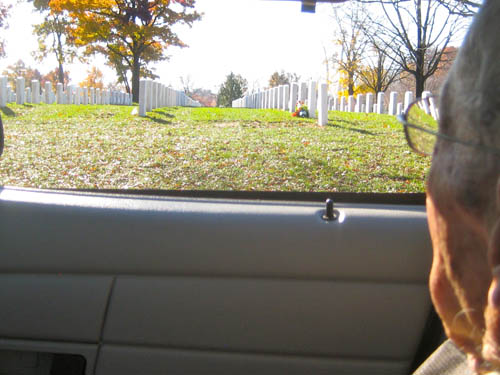
(Mac looks down the row in Section 66 at Arlington National Cemetery. We will all be there again in a couple months. Photo Socotra.)
Copyright 2012 Vic Socotra
www.vicsocotra.com
Phnom Penh
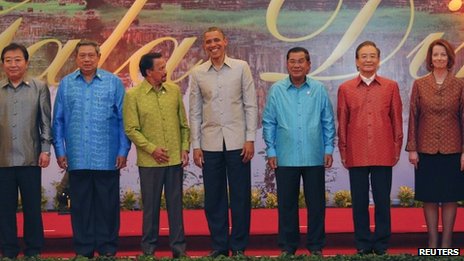
(President Obama- center- does a photo op with ASEAN leaders. The dispute in the contested islands left a bad taste in everyone’s mouths. Photo Reuters).
It is getting just cold enough at the end of November that I am starting to get happy-feet thoughts about going someplace warm. Talking to ENS Socotra about duty in Asia naturally turned my mind that way, and then, in the chill thin sunlight and crisp breeze at Arlington National Cemetery yesterday, I had to consider the harsh reality of how we came to be an Asian power, and exactly how we are becoming not one.
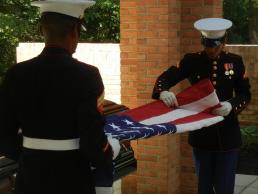
(No one does a ceremony like the United States Marines.)
The Marine who was being laid to rest was one of Mac and Dad’s generation, which is swiftly leaving us. This Marine won the Silver Star on Iwo Jima long ago, and I wanted to honor his memory. His son Ralph provided a press clipping about that awful day when steel rained down on black sand, and The Marine took it upon himself to suppress some of that awful rain by improvising explosive charges and crawling across that sand to detonate them at the cave entrances from which the Imperial Japanese troops were firing, sealing up five entrances and trapping the enemy underground- forever.
He was a Private, First Class, and hence did not rate the horses and gun carriage, but the Marines of today did him proud. It is a special thing to be one of The Few, and it was an honor to be part of the final farewell.
But I was drawn back to thinking about Asia, and have a hankering to go back again. I saw an article in the Asia Times that made me wonder what I will think of it when I see it.
I noted that the President took a post-election jaunt to Burma. I have always wanted to go back and stay at The Strand without hauling bags for a Congressional Delegation. The luxury of that Colonial-era gem of a hotel stays with me. It would be fun to just hang out, maybe get up-country. Visit Cambodia and Laos, places that were off limits in the time when I lived and traveled out there.
I am thrilled that people are talking about a strategic pivot to Asia. The Marines are going to rotate through Australia- a ticklish maneuver that has to respect Aussie sovereignty and not poke the Chinese in the eye. The Navy is going to re-position forces to the Pacific. It is about time.

(One of my modern heroes: The Lady who stared down the SLORC at the 20th ASEAN Summit. Photo Reuters.)
When the President traveled, the spotlight was on his talks with The Lady- Aung San Suu Kyi. Her long years of house arrest were over, and she was free as the hard-line military government I met as The SLORC mellowed and began to open up to the outside world.
There was more to it, though, and it was not a story that the media felt like talking about.
The Asia Times did though. I can’t evaluate it properly, nor do I vouch for it as the gospel of anything. But here is what the article claimed
“Post-US world born in Phnom Penh” was the title, and in it a columnist named Spengler, a pen name adopted by a former leftie-turned-La Rouche supporter named David Goldman. He took the “Spengler” name from the German philosopher Oswald Spengler, whose 1930s masterwork was entitled “the Decline of the West.”
As Spengler, Goldman looks at issues in the Far East from an Asian perspective, distinguishing his commentary from the mainstream English-language media, whose reporting is generally by Westerners, for Westerners, just as the coverage of the meeting between the Nobel Peace Prize-winning President and Burmese dissident icon.
I certainly thought that is what the trip was about. Spengler hastens to disagree.
He is biased, of course, but then all the Western media is. Here is what got my attention: Spengler claims that among the triumph of the meeting with The Lady, the United States suffered the “worst humiliation ever suffered by it as a nation.”
That is a bold assertion. By that, Spengler claims that at the 20th ASEAN summit in Phnom Penh “fifteen Pacific nations whose population amounts to half of all the people on earth agreed to form a Regional Comprehensive Economic Partnership.” If it sounds like the old Greater East Asia Co-Prosperity Sphere, you would be correct, since it excludes the United States.
The un-reported story is that President Obama attended the summit to sell a Trans-Pacific Partnership that excluded the Chinese. That initiative died without a whimper, and ASEAN nations will be joined by China, India, Japan, South Korea, Australia and New Zealand to form the new partnership.
I am all for regional peace and prosperity. I hope that the tension over claims to the islands of the East and South China Seas does not erupt in violence. I hope Spengler is just a doctrinaire jerk and that he is wrong, with all his squiggly charts showing trends going all the wrong way for the States. It makes the Asia Pivot in foreign and military affairs a little suspect. Asia may just be going its own way after 67 years with the American titan in the middle of everything.
I had to think about that, standing in the chill, watching the Marines fold the flag over the ashes of one of their comrades, a hero who with his buddies made his time in Asia the beginning of an American Century.
If Spengler is to be believed, that might be changing. The ‘pivot’ will make it interesting, don’t you think? I wonder if it is enough.
Copyright 2012 Vic Socotra
www.vicsocotra.com
‘Tis the Season

(Elisabeth-with-an-S, a known lawyer, and Mac at the Willow Bar, 04 November 2010. Photo Socotra)
Christmas music leaked out of the clock radio on my desk as I looked out the office window. “Not ready. Not yet.” The clouds were low and gray and chill and way down at the bottom of the concrete canyon I could see some of the building guys wrapping the retro-styled lamp-posts with green garlands. Not ready.
It certainly has become topcoat weather, just in time for the Arlington ceremony for the father of a co-worker. I was thinking about how many layers of clothing would be required to show solemnity while maintaining a modicum of comfort.
And the Arlington thing- you know, the physical separation of the event of departure with the orderly internment of the remains, makes these events a two-part deal. I do not know when Mac’s funeral will come around. I am still getting used to the idea that he is not in the unit up there in The Madison.
He was very much in my thoughts as I tried to pull together the latest issue of The Quarterly, which was basically written and ready to go before he left us. The challenge is to honor his amazing life and still get the copy to the lay-out people. I was musing on how to do that when the cell phone went off in the pile of devices to the left of my computer.
I peered at the screen that flashed bright with the incoming call. It was my associate in Stockholm, who had lost her car. It is one of those things I hate, since it can mean the onset of some sort of mental failing, and I am constantly alert to remember where I parked.
“Snow is coming,” she said in that marvelous softened Midwest accent that has been tempered by daily usage of Swedish as her primary language for the last few decades. “Maybe by Saturday. It is dark and has been since two-thirty this afternoon. It is cold rain and is horrible suicide weather here.”
“You need to find your vehicle,” I said.
“I can’t remember if this is the right station. I am sure it was all clear before I went to Amsterdam on this swing. Banking is insane here. I have the sense of impending doom.”
“Is the Euro going down?” I asked. “I am sorry, I am not tracking economics or politics at the moment. I have had it. I need to get with the holiday spirit.”
She agreed, and gave me the inside story of what it is like to be perched in the northernmost tier of a semi-united Europe in a nation with an advanced social welfare system that is so good that many people just stay home. It is that time of year in the High North. The idea of going home and cocooning had a certain appeal at the moment, and as she completed a square search for her vanished Volvo, she told me she had to go and find a cab.
I was looking through the thick pile of annotated interviews I had conducted with Mac. There were sixty or more of them, plus a few for which I had only assorted piles of bar napkins. It looked like a daunting project to sort and re-edit.
I found the one from two years ago that featured the beginning of our friendship with Liz-with-an-S. I marveled at how good Mac looked that afternoon in early November, just two years away from his leaving.
The phone went off again. “Found the car. It was at the train station, not the one I thought. Life is OK, although it cost me $12 bucks for the cab ride.”
“What is that in Kronors?” I asked.
“One hundred,” she said. “Cheap, since it got me my car back.”
“It is a good thing Sweden did not adopt the Euro,” I said. “It might have got more expensive while you were driving.”

“You are crazy,” she said. “As the Swedish krona is one of the least traded world currencies, it is more sensitive to sudden swings. They are saying we are 25% overvalued against the dollar, which means a depreciation could quickly become more severe if institutional investors decide to dump the currency. We have been doing well as a safe haven for those fleeing the Euro.”
“I guess that is why the poor old dollar is still hanging on,” I said. “It may be crazy here but apparently it is better than everywhere else. I heard they were going to put Greta Garbo on the hundred Kronor notes. That is something that couldn’t happen with the Euro.”
“No, we just vant to be left alone,” she laughed. And Merry Christmas to you!” she said before she rang off into the Stockholm night.
I looked at the pile of papers and the pile of devices. I really need to get in the seasonal spirit. My mood brightened immediately. I could start with the lights back at the apartment.
See, it is a lot easier to get with the spirit if you never took the lights down to begin with.

(Plants with lights. Photo Socotra.)
Copyright 2012 Vic Socotra
www.vicsocotra.com
Country Manners

(Jim at the Willow bar. Photo Socotra.)
I was talking to Old Jim at Willow last night. It was a back to work Monday, and the Christmas decorations were up and I am still not ready for it. I had done some Internet Monday stuff when the network at the office cooperated, and had a bit of buyer’s remorse about the whole thing.
Jasper had been up on the bar through the afternoon, stringing ornaments off the faux ceiling. “I’m a monkey,” he said with a modest grin. “I am the one who can get up there.” I shivered a bit, imaging falling off the bar and crashing down to the hard wooden floor.
Funny what you think of, when life changes. I used to enjoy crashing into things. Not so much any more.

Jon-without was working on a PowerPoint presentation on the bar in front of him. He was drinking happy hour white, and he explained he was supposed to deliver the pitch to a visiting Ukrainian delegation seeking smart solutions to coal-fired power generation, which is to say, “go ahead and burn the stuff if that is what you got.”
People lobby for the oddest things around here, but of course this is Fantasy Island, not reality. I know the coal industry is on the block, but it seems sort of crazy to be junking a whole economic sector before something else is in place. But what do I know, and besides, I have resolved to stay away from politics for a while.
“You guys have been driving me nuts,” glowered Jim. “I am just glad the election is over and you lost.”
“I am not a Republican,” I said primly. “I am a libertarian without a party.”
“It amounts to the same thing,” he replied. “You and John-with and Jon-without and Jerry the Legal Beagle can just stuff it.” Jerry spread his grin wide. “Four more beers!” he called to Jasper. “And mind your manners!”
ENS Socotra stopped by to deliver a dozen eggs I had asked him to get at the Ft Myer Commissary, the single most influential outlet in the Defense Commissary system, and then we talked about the prospects for his next set of orders. He would prefer San Diego, natch, as opposed to someplace out in the sticks like NAS Lemoore.
The new scheme is to open up the aperture, a concept which includes the possibility of going to a Strike-Fighter squadron on the Washington Maru out of Yokosuka. The idea was striking. Japan is a great place, once you get the manners of the place straight.
“In Japan, people feel it is OK to come right into your house. It is natural for them to stop inside the front door, which would have consequences here.”
“It seems a long ways away,” he replied. “But I imagine I could get used to it.”
“It is not as far as you would think, once you get used to the local manners,” I said. “You should see how far away Cajun Country seems right here in our own country.” I fished in my backpack for the iPad, slid the little slider thing on the screen and entered my security code. “Check this out,” I said. “My pal Boats wrote me another one of his treatises on Vultures, Universal Mongrels and manners in the country. I have been taking some notes on how to act down at the farm. Take a look.” I handed over the device and the ENS looked over these words:
At my Uncle Mel’s place the “Circle M,” a cattle ranch in what was in my childhood the deeply rural part of St. Tammany Parish, Louisiana several dogs stayed in a large dog house about 50 yards from the house…they never really bothered visitors, they didn’t leave the doghouse area, they weren’t that attached to the human house. In this sense they were alarm, not watch dogs.

(Country Barn. Photo Dave Allen.)
These dogs fully expected my Uncle, Aunt, or one their five boys to appear at the door before the car, or rarely horseback or pedestrian visitor reached the house. If the visitor was not identifiable to the humans in the house, the residents would go inside and reappear with the duty shotgun.”
This must have appeared quite sensible to the dogs, which generally paid no further attention to the matter. Humans would come and go from the house at different times and for different purposes and would always elicit a “heads up” response from the dogs who would rarely stir from their restful positions around the dog house.
The dogs had quite a different reaction when someone exited the house with a shotgun and walked away from the house. That signaled the hunt was on. They would fall in behind the gun-bearing human and follow to the edge of the woods or fence line, then take the lead, heads down and sniffing. We’d simply follow them to rabbits and quail for the table. Occasionally they’d scare up a wild turkey.
Keep that turkey in mind a its a key to the system I’m trying to describe to you. But first since this may find its way to a Yankee audience I’d appreciate a few words in defense of my gun-toting relatives.
Now in defense of what seems like an inhospitable attitude of greeting unknown visitors with a shot gun to the average Yankee who simply writes off the Southern Rural practice as a sign of cultural backwardness, keep in mind if a stranger intends to do you harm when your nearest neighbor is miles away, and go outside to greet the possibly ill-intended visitor unarmed, you are dead.
Lots of these sorts of thing happened ion the Deep South between 1865 and 1965. My Aunt and Uncle didn’t point the shotgun at the stranger, they just had it in hand on first greeting which was usually delivered in a friendly tone.
Most people in the South at the time understood the precaution and never took offense at the mere sight of a person with a gun not aimed at them. The idea of being offended by the mere sight or possession of a gun is a concept totally alien to the South. Frankly, we believe that people who will not purchase, train with, and maintain a gun can not answer the county or parish sheriff’s call for militia or posse back up, and therefore should pay a special tax for the extra police protection that such an attitude generates.
While the New York City mind sees gun ownership as a danger, the Southern rural mind sees it as a civic obligation and response to posse call out, or enhanced physical security, as a sort of tax in kind.
If you won’t provide the service you should pay a cash tax to support the extra police personnel that it takes to keep order. We’re not saying the New York attitude is wrong for Manhattan, but why do they think what’s good for them is good for everyone else?
When the local sheriff received state police intelligence of bad guys headed our way, a telephone tree was activated as a simple reminder to those located outside the town limits of the Parish Seat to lock doors (not a usual habit), and follow the usual precautions (which everyone knew meant answer the door or a strange visitor with gun in hand.)
My grandmother saved at least one life, and captured two thieves on her property with this practice and my Uncle foiled one robbery on his property the same way. The distance between the events was over 50 years but that apparently was often enough to reinforce the lesson. You really have to wonder how bad the rural crime level might have become if the custom hadn’t have evolved, and local law enforcement learned how to harness it.
Let me get off my soap box now. We Cajuns actually appreciate the the “back to the land movement” among the children of our late invaders. Perhaps finally non Southerners may understand that some of our “cultural quirks” are not “quirks” at all but just good common sense for a rural or semi rural environment, including a “gentleman’s estate.”
We Southern children of the “Greatest Generation” learned these things first hand, even if we were raised primarily in the city. The South was the last place in the country where most people still had relatives they spent time with living on the land.
Today in Atlanta, Houston, and quite a few other places young Southern adults are growing up without this connection and understanding of the land. In terms of attitude, this next generation of big city Southerners seem as alien to my generation as New Yorkers.
Yuppies from Houston, and Atlanta, as well as New York worry me. I’m afraid they may not be able to survive more than a ten minute drive from a Starbucks, yet they are dead certain that their attitudes and knowledge are superior to everyone else.
So, we’d like to encourage all of the members of our generation north and south who possibly can to do so, to get some small acreage within an hour or so drive of the grandchildren. Get the little ones out there often and teach them the lessons of living a bit closer to the earth.
For many of you Yankees, that may mean learning the lessons first yourselves. Back around 1900, our values were closer to those of the founding fathers. Those values were formed in closer proximity to nature.
With now less than 3% of the population literally living off the land, we need more people at least living on the land even if their income is derived from non-agrarian activities.
That is where our seemingly contradictory traditions of self-reliance and cooperative endeavor first found their unique American balance. We need to replace the class warfare thing with a bit of that.”
The ENS looked at me skeptically. “You are going back to the land? That is absurd. I can’t see you plowing up the front yard of the farm to grow vegetables.”
“Well, it is sort of a metaphor about manners,” I said. “Plus the Russians are actually growing things already, and are going to put in grapes.”
“Figures you would be living a metaphor and mooching tomatoes.”
“Would you care for another beer?” I asked.
“That is the sort of metaphor I can get behind,” said the ENS.
“Mind your manners,” I said.
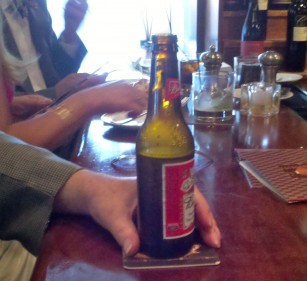
Copyright Boats and Vic 2012
www.vicsocotra.com
http://americanadmiraltybooks.blogspot.com/
Universal Mongrels

It is said that there is always a simple solution for the toughest problems. The only problem with that is that it is almost always wrong.
I got a lot of advise on what to do when the Turkey Vultures are chased out of the Southgate neighborhood by loud music and flashing lights, or are relocated to my property by functionaries of the Department of Agriculture.
That is essentially the solution that got Manuel Noriega out of the Papal Legation building in Panama City during Operation JUST CAUSE.
The PSYOPS guys from the 4TH POG set up speakers outside the building and played various requests from a 95-song playlist to drive the bantam dictator nuts. The Marines asked for “Welcome to the Jungle,” the canine handlers requested Billy Idol’s “Flesh for Fantasy,” and the Special Forces wanted the Door’s “Strange Days.” Other calls were for patriotic songs like Lee Greenwood’s “God Bless the U.S.A.” and hard rock songs like “We’re Not Gonna Take It” by Twisted Sister.

(Field mod: PSYOPS speakers on a GPK turret shield. Photo US Army).
Other favorites included titles intended to soften the mind, and encourage Noreiga to surrender: “Born to Run,” “Bring Down the Hammer,” “Dancing in the Streets,” “Hang ‘Em High,” “I Fought the Law and the Law Won,” “Judgment Day,” “Nowhere to Run,” “Run Like Hell,” “The Party’s Over,” “They’re Coming to Take Me Away,”

(The smelly but elegant Culpeper variant of the Turkey Vulture. Photo Culpeper Clarion-Bugle.)
I don’t know if that line-up will intimidate the ornery birds- which term, by
the way, is a bit of a misnomer. My SoCal attorney offered the learned opinion that the birds are a necessary part of the food chain, are basically gentle, and with exception of that vomiting-and-carrion-thing, are very elegant. Linda-of-Many-Children opined that things were just more sensible at her hacienda south of the border- the Mexicans currently have their hands full with other matters.
That is undoubtedly true, but under the terms of the Migratory Bird Treaty Act of 1918, it is illegal to kill this species in the United States.
As an alternative to PSYOPS, my pal Pete wrote from Tidewater to suggest the purchase of a 55-gallon oil can, petroleum distillates and repeated bursts of gunfire (limited strictly to the property) on the assumption that the Southern manners of my neighbors would preclude intrusion on my property to investigate a purely routine matter of semi-automatic gunfire.
It is a drastic step, I know, and I am inclined to honor international treaty and go with something less kinetic.
The Russians next door kindly offered the services of Biscuit, the Wonder Dog, as a countermeasure to offensive avian invasion. I think that is a matter that bears further investigation, and along that line I got a surprisingly
exhaustive treatise from my pal Boats, the retired USCG Master Chief Bosun’s Mate.
As a life-long resident of Cajun Nation, he put the Southern Context on rural pest management, tempered by the provisions of the 1918 Treaty, and informed by canine biology. He said:
“Should the turkey vultures decide to attempt to colonize Refuge Farm we Cajuns (who likewise suffer greatly from federal interference in local environmental issues) have a sure-fired cure that I propose to modify here in for semi-absentee small farm/large estate owners.
Here it is, get a dog, really excitable “yappy” dog prone to chasing. OK, but don’t stop reading there is more to it than that. The more it looks like the nearly extinct red wolf of the Southern Atlantic Coastal and Gulf Coastal plains, or its successor the coyote the better, (and they are very similar in size and shape, differing mostly in color) but don’t don’t go below 35 pounds or you’re just feeding the damn vultures, not sending them off to some less “patrolled place.”
There are plenty of these mutts around, picture a German Shepard shrunk down to a 35 to 50 pounds. These are found around the world where feral dog packs are found. They are called “the “universal mongrel.”
 (Universal mongrel, meaning no disrespect. Photo SPCA).
(Universal mongrel, meaning no disrespect. Photo SPCA).
Given about ten generations of feral dogs of any breed this is what you wind up with, a coyote like animal that is slightly more omnivorous than a coyote, less people shy, more cooperative, and communicative within the pack and with any humans that will engage them. After about 20 generations of being feral these dogs not only take on that pointed ear, alert but smaller, lighter shape of the German Shepherd, they begin to take on a more uniform coat, of light brown color.
When we look at the universal mongrel we are probably looking at the actual animal that first domesticated man. No, I don’t have that in reverse, science actually believes that the dog approached man by coming close to the camp fire looking for scraps and not fleeing very far or with much alacrity when our ancestors started throwing stones at them.
When daylight came the dogs would follow the hunters to try and share in the remains of the kill. Sometimes they would actually try to lead the men to the game. That pattern was repeated until man learned to let the dog lead the hunt and then help in the kill bringing down much larger protein-rich kills and learning to share with the dogs to insure their continued services.
Anyone who doesn’t believe this has simply had some kind of urban upbringing and never really lived with real country “hunting dogs.”
At my Uncle Mel’s place the “Circle M,” a cattle ranch in what was in my childhood the deeply rural part of St. Tammany Parish, Louisiana several dogs stayed in a large dog house about 50 yards from the house. They were a handy intrusion alarm barking at any strangers who drove up the half-mile lane from Old Military Road across the lower portion of the property. However they never really bothered visitors, they didn’t leave the doghouse area, they weren’t that attached to the human house. In this sense they were alarm, not watch dogs.
These dogs fully expected my Uncle, Aunt, or one their five boys to appear at the door before the car, or rarely horseback or pedestrian visitor reached the house. If the visitor was not identifiable to the humans in the house, the residents would go inside and reappear with the duty shotgun.”
But that would be the topic of tomorrow’s essay on Southern manners, and how they apply to life down on The Farm, even if we are up to our asses in vultures. It is much more straightforward there than it is in Arlington.
Copyright 2012 Boats and Vic Socotra
www.vicsocotra.com

(The Vultures of Culpeper. Photo Rob Graham, WINY news).
It must be Sunday. No gunfire. I know there is a ton of stuff to be concerned about, but honestly, life is pretty good. More than a couple days at the farm and I can feel the rhythm change, some of the Beltway angst drain away. I was wondering about turkey vultures, the roosting habits of which were the number one story in the Clarion-Bugle.
Above the fold. These are alarming and hostile birds, and this is quite a different kettle of fish from some theoretical policy question back inside the Beltway.
This whole matter pits locals against the birds, which have struck up an alliance with the Agriculture Department against the elected city government.
The matter has been an issue for ten years.
Finally, the city has come up with a plan that is acceptable to the federal government. They re going to go after about seventy of the big cranky black birds and relocate them. I hate to be a NIMBY about this, but I sure hope they don’t get relocated here.
It is illegal to shoot them for some reason. If it wasn’t, a well regulated citizenry would have blasted them a long time ago. You need a Federal permit since for some reason the government is protecting vultures. That may just be professional courtesy, but the alternative to killing them is to drive them crazy with noise and flashing lights early in the morning, which may be irritating to just about everyone, flight-capable or not.
Federal and town officials have been working on this effort for about 10 years. It won’t start until next week, so I will just hope they don’t chase the vultures over here. If they do, I don’t think the garden Gnome is going to frighten them off.
Copyright 2012 Vic Socotra
www.vicsocotra.com
The Gnome

(Don-the-Builder’s guys have finished the path where the famous Socotra Garden Gnome will soon take up quarters. Photo Socotra.)
Projects. Having more than one day in place at the farm was liberating. I was all over closets and crap that had piled up over the last few seasons.
The jumble was an affront to the ordered mind, though goodness knows I have been able to ignore it with equanimity this very strange year. There was a stockpile of paint-cans in the pantry, a hoorah’s nest in the closet, and several minor projects to be done. That included the diminutive form of the Family Gnome who has been standing next to the front door since he arrived from his resting place on the dirt of the crawlspace of the Little House on the Bluff in Petoskey.
He was in sad shape. The panes to his lantern were long gone, the cord to his light moldered away and this black boot badly patched with something that looked a lot like automotive Bondo body filling putty.
I had made half-hearted preparations in anticipation of his resurrection. I actually had the new panes for the lantern, new electrical cord, sandpaper and spray paint in two colors.
There the matter rested since about 2010. It seemed like the time was at hand, and I dug into the project while luxuriating in the delightfully temperate sunshine on the back deck.
I painted the glass, sanded the boot to a smooth unblemished surface, rewired and routed the cord from his lamp to the aperture in his nether regions and fitted the glass once the paint had set.
Not bad, I thought. The Gnome had first jointed the family in 1907 or so, and graced Bumblebee Way at the big house at 98 Sagamore Road in Maplewood, New Jersey. He has known four generations of Socotras in his time, maybe five. His repair was long overdue.
I don’t know what he was supposed to holding in his left hand. There is a hole in his palm that obviously held something at one time, but there is no evidence of what it was, unless there is an old picture in one of the boxes in the garage I will get through some day.
I thought it would be more festive to adorn him with one of the flags associated with the family, and I ordered a selection of them on the internet last year. Naturally, I had done nothing with them since. Once the dwarf was standing, I tailored the stem of the Michigan State Spartans to fit in the opening. Voila! The Gnome returns!
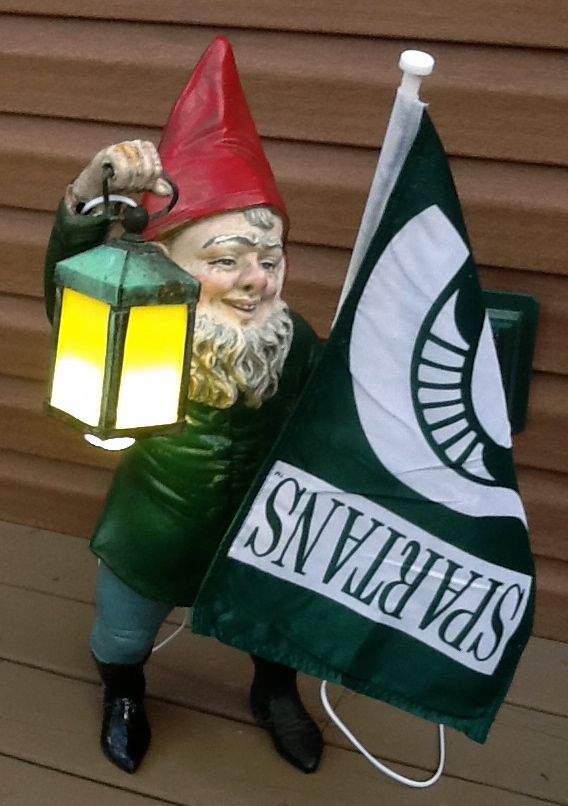
Then, basking in triumph, I mixed a drink and did a chore that did not require nearly so much digital dexterity.
I tackled the closet. I moved one of the dining chairs over so I did not have to stoop and was sorting out canned goods and ammunition from the weatherproof containers in the closet and thinking about what to cook for dinner when I stopped to check email. I have ordered my last stockpile of ammo, I think. Enough is enough.
This stuff drives you a little crazy. Part of it is preparation, and part of it is hedging one’s bets about the future. Some people say gold or silver is a good thing, but I suspect that a truly balanced portfolio includes the two items from the old joke about investments for troubled times: canned goods and ammunition.
At Willow the other evening former-Marine Chris recommended an outfit called “Georgia Arms” for bulk service. We had been talking about the sad state of availability of cheap, reliable ammunition. Many of the big retailers are out of desirable military calibers because of the competitive demands of private owners in the wake of Mr. Obama’s re-election and the vast buying spree of the Federal Government earlier in the year.
That is what is troubling folks out in rural area around Refuge Farm. There has been regular gunfire around the farm for the last two weekends, a function of deer season, and sporadic bursts of fire for proficiency the rest of the year. People here are serious about their guns- Randy at the Shed Store on Route 3 tried to sell me a nice shotgun in .410 when I stopped to inquire about the cost of a pre-fab gazebo for the turn-around island in the gravel driveway.
Anyway, I wasn’t in the mood to acquire another ammunition requirement, and satisfied my lingering investment needs from Georgia Arms for 9mm Lugar, .357 S&W, and .22 Stinger in long-term storage ammo cans. The Feds seem to have wanted the .45 and .223 and there just isn’t any around.
Anyway, times being what they are, I received an alarming note from one of my Eisenhower-era progressive buddies. It contained a very alarming introduction to the story flying around the internet. I sighed. It is the usual mix of truth and alarmism, just like global warming or the suitability of wind power. I opened the note with a certain jaundiced gaze. The header read like this:
“Is this the start of the private army of 750,000 men Obama wanted to create soon after his first election?????…….j”
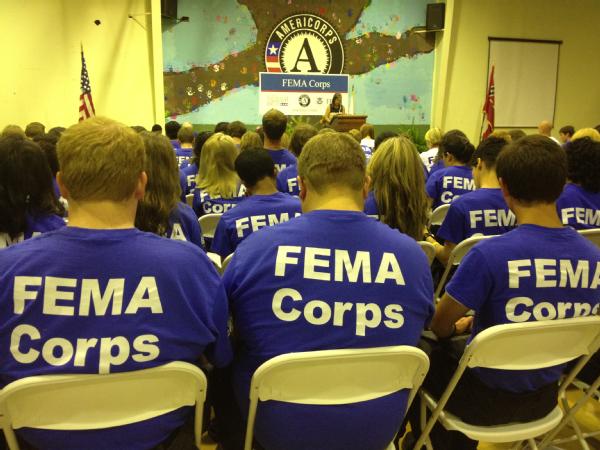
(The inaugural class of FEMA Corps, the new hybrid DHS organization created from the ranks of Americorps. They do not appear to be a new Marine Corps. Photo DHS.)
Geeze, I thought. Here we go again with the Black Helicopters. I jumped all over it- besides, there is nothing to do outside when it is getting dark and the deer are on the move. Running around in the pastures is a good way to get shot. I deferred dinner and sorting until I had checked some of the usual sources and thought I got close to what the truth might be.
One of Mr. Obama’s pet projects from the get-go was the establishment of a precinct-based civilian volunteer organization. The idea has been around for a while and is a pet rock for Democratic Chief Executive and nothing new except for scope. His Americorps was intended to be the domestic equivalent of the Peace Corps. You know, helpful college kids showing up to show the locals how to dig wells or apply for government benefits.
This goes directly back to the Clinton Administration, and has its antecedents in the Volunteers in Service to America (VISTA) program envisioned by John Kennedy in the days of Camelot.
Granted, there were some troubling military terms used when Mr. Obama announced his re-invigoration of Americorps and several similar organizations in a campaign stop in Colorado Springs back in 2008, before his first election. He said: “We cannot continue to rely only on our military in order to achieve the national security objectives that we’ve set.
We’ve got to have a civilian national security force that’s just as powerful, just as strong, just as well-funded.”
He was talking about an organizational construct of around a quarter million people to do good works, but the scope was sort of breathtaking and the reference to the military unfortunate, since some of the organizations he referenced had been established by the Bush administration in response to 9/11.
Apparently some folks took him at his word. This is the brand new wrinkle, the creation of 1,500 paid positions for young people in what they are calling the FEMA Corps. It has some people hyperventilating.
In the wake of mutant storm Sandy and the attendant damage to New York City and New Jersey, you could say that FEMA’s possession of the equivalent number of ready volunteers in the numbers of an Army Regiment might be a good thing.
Or, you could say: “WTF? Who are these people and under what authority are they working?”
Like I said, it could be just another of the grab-bag jobs programs associated with the stimul that is going to be well-overseen and completely peaceful. The alarmist note went over the top, featuring pictures of armored vehicles, some of them painted black and adorned with the logos of the Department of Homeland Security, of which FEMA is a charter member.
The tanks in the pictures are all indeed military-spec and heavily armored, but they are clearly labeled as being subordinated to organizations with charters for deadly force. Regulated deadly force, mind you, and that is the other component of the response to this wonderful initiative.
If they had made this program subordinate to the Governors of the States I imagine there would not be such hysteria about it. But it is part of an Executive Branch agency, the Department of Homeland Insecurity, and thus to the President.
People simply do not trust the government. I used to be in it, and I don’t.
This is not a threat, or better put, it is just another manifestation of the National Security State we have decided to establish. I doubt if we will be seeing any of these young people down in Culpeper County unless thing are really screwed up.
But still, the reaction to this apparently harmless event is enough to make you turn the lights out on your lawn gnome and maintain standard vigilance, you know?
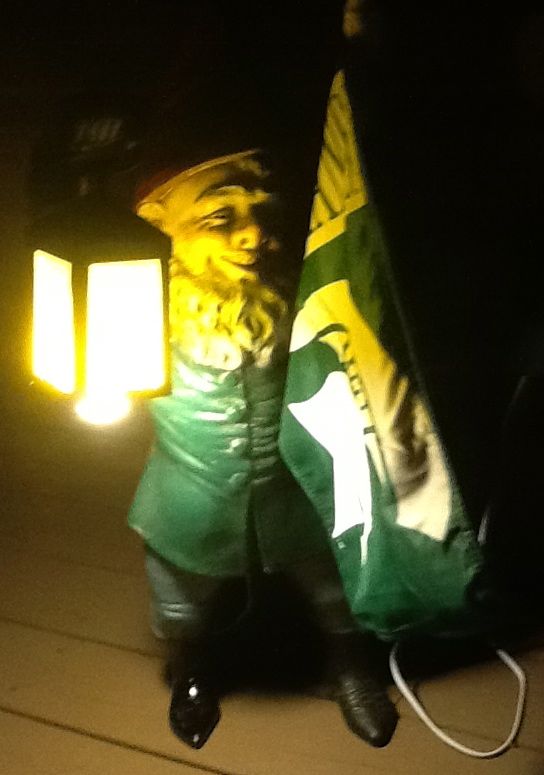
Copyright 2012 Vic Socotra
www.vicsocotra.com
Tisquantum
 (Tisquantum, or Squanto, teaching the Pilgrims to grow corn. Public domain image via Wikipedia).
(Tisquantum, or Squanto, teaching the Pilgrims to grow corn. Public domain image via Wikipedia).
I turned on the television after returning from a drink with Old Jim and his bride Mary at Willow last night. It was slow in the bar- the night before a holiday causes Arlington to flush out with the young people going home to celebrate the holiday, though Tracey O’Grady mentioned that she anticipated serving 275 plates of turkey and all the trimmings.
“I am heading down to the farm,” I said. “I am just going to go with something light and local. The eating holidays make me a little crazy,” I said, paying the tab to Brett, the new bartender who looks exactly like the young James Garner from his Maverick days.
At home, the flat-screen contained the usual assortment of nonsense- NBA games and the like- which held not appeal. Scrolling through the lower channels I came across “A Charlie Brown Christmas.”

(Snoopy and Woodstock celebrate the Pilgrim experience. Image Copyright Charles M. Schultz.)
I had not seen it in a while, and despite my now-customary light touch on the holidays, I settled in to watch it.
You may recall the classic animated seasonal tributes from the once mighty Peanuts Empire of Charles M. Schultz. The Christmas and Halloween outings are the most familiar, but this one celebrated Thanksgiving, and despite the hip jazz score, I was astonished at the dialogue of the cartoon characters.
The events of the Mayflower passage were part of the tale, and the privations of weeks at sea, and the great storm that pitched the little ship wildly and cracked a main overhead beam. The voyage damage was severe enough to nearly cause them to turn back. A great screw-rack shored up the damage- and a nice bit of improvised ship’s chandlery in stout V-shaped braces- and the voyage proceeded.
The themes were didactic and manifold, but anchored in stern religious faith, expressed in a way that is completely incorrect these days. And of course the inspirational story of the welcoming Indians.
That is completely out of fashion these days. According to Peanuts, the legendary Squanto was quite the animated stereotype, and his ability to speak English was regarded as a manifestation of Divine Providence. His skills at farming and fishing enabled the little colony to squeak by that first year, and the Pilgrims struggled but adopted his methods and ultimately survived those first desperate winters.
Just as a sidelight, as an adopted Virginian, it has always struck me that the Pilgrim narrative must be associated with the Civil War, and the final solution for the secessionist states. Lincoln declared this fourth Thursday in the November of 1863 a national holiday, at least in those parts of the several states in which his authority held good.
Naturally, the only narrative appropriate to those desperate days was the one of the newly-arriving Pilgrims and their three-day feast in 1821.
Squanto was pivotal to the Peanuts story, and it is well deserved. Squanto- or Tisquantum, in the tongue of his native Patuxent Tribe, is credited with teaching the Pilgrim Fathers and Mothers how to fish, and plant maize, and interact peacefully with the native inhabitants.
Squanto had quite the backstory. He had been kidnapped while hiking back toward Patuxent lands from Jamestown. He was captured by Englishman Thomas Hunt, one of John Smith’s lieutenants, who was planning to sell fish, corn, and captured natives in Malaga, Spain. He reckoned Squanto and his comrades were worth 20 pounds sterling per head.
Squanto escaped, or his enslavement was commuted, and he traveled from Malaga to live in London for a time, learning English along he way. When he had the chance to return west across the water, he took it, landing first in Newfoundland before eventually heading south toward home.
He discovered that in his absence, his whole tribe had perished from a horrible epidemic. It was possibly smallpox, or another contagious disease of European origin for which his people had no natural immunity.
When Mr. Lincoln made Thanksgiving a national holiday, the narrative of the Pilgrims had none of the trappings associated with then-current war between the states. That is the pivot of the modern story, since there are no Virginians in the Pilgrim story, unless you count Squanto.
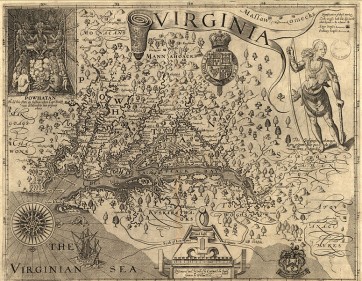
(Map of Virginia, circa 1606, discovered and as described by Captain John Smith, 1606; engraved by William Hole. Source: Library of Congress).
In Virginia proper, Thanksgiving services were being held routinely as early
as 1607, with the first permanent settlement at Jamestown holding a feast of thanksgiving in 1610.
On December 4, 1619, thirty-eight English settlers arrived at the Berkeley Hundred, a tract of some 8,000 acres on the James River, twenty miles upstream from Jamestown. The group’s charter required that the day of arrival be observed yearly as a “day of thanksgiving” to God.
On that first day, Captain John Woodlief presided over held service of thanksgiving. As quoted from the section of the Charter of Berkeley Hundred specifying the thanksgiving service: “We ordaine that the day of our ships arrival at the place assigned for plantacon in the land of Virginia shall be yearly and perpetually kept holy as a day of thanksgiving to Almighty God.”
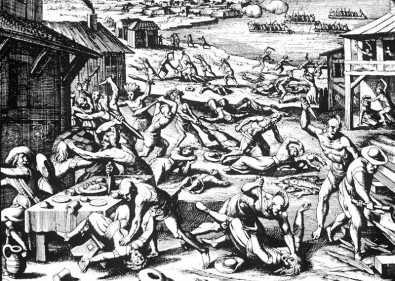
(A 1628 woodcut by Matthaeus Merian shows the March 22, 1622 massacre when Powhatan Indians attacked Jamestown and outlying Virginia settlements. The image is largely considered conjecture, though the deaths were real enough.)
According to the memoirs of John Smith, in 1622, the year after the Pilgrim feast, braves of the Powhaten Confederacy “came unarmed into our houses with deer, turkeys, fish, fruits, and other provisions to sell us”. Suddenly, the Powhatan grabbed any tools or weapons available to them and killed any English settlers who were in sight, including men, women and children.
Chief Opechancanough then led a coordinated series of surprise attacks on the colonists that that killed 347 people, a quarter of the English population of Jamestown, and nine in the Berkeley Hundred.
The forward settlements were abandoned as the colonists withdrew to Jamestown and other more secure points pending arrival of reinforcements.
Later, of course, the colonists would later sweep up the Northern and Middle Necks of Virginia, where so much of our national history was contained for the first two centuries of our national life in the wilderness of North America.
The events that occurred in the Berkeley Hundred have much more in common with the subsequent history of this land than the peaceful dinner up in New England the year before.
Anyway, I was absorbing the quaint message from the Peanuts Gang as I shook my head. That animated version of history is the one I remember from school days long ago. I do not think they learn it that way anymore. But considering that Mr. Lincoln widely recognized that we needed a holiday of Thanksgiving to Almighty God in that bleak year of 1863, and chose another narrative more compatible with the struggles of the North.
No Virginians. So is history made, or the past created anew.
I am glad Snoopy got his version on tape before the Revisionists got their claws into the story to promote the narrative of the moment- which celebrates the stories of those who got run-over in the great race to Manifest Destiny, sea to shining sea.
Have a splendid day and wonderful dinner, and give thanks for how we all got here through the dark forests that bounded the shores of this far and distant side of the storm-tossed Atlantic Ocean.
Thanksgiving indeed.
Copyright 2012 Vic Socotra
www.vicsocotra.com
Depletion

(Hydraulic Fracturing is about to change everything we know. Or is it? Image courtesy Popular Mechanics.)
It is a complex matter, and a controversial one in this about-to-be awash in oil nation. We might very well be cooking with gas for a while- and have a magical chance to get it right for a change.
The whole eruption of resources here in this land we thought once was depleted is rife with controversy, but it is happening anyway, regardless of who is sitting in the White House, or what rules and restrictions secular religious environmentalism tries to impose upon capitalism red in tooth and claw.
This matter is one of the things that gives me hope- a literal second chance for us to make some fundamental choices about where this great nation is going- or on a more personal level, how it will go while I am on the planet and not spread over it.
My early giddy realization was that America might be energy independent within a decade. Moreover, we might have a century of exports available to power the world as we prepare for the inevitable depletion of the petroleum.
The optimism was tempered by the inevitable response: the reality is, goes the claim, that the new reserves discovered are being depleted faster than expected, and the whole circus event will peter out with a whimper, leaving us exactly where we are now: saddled in debt, dependent for energy on people who don’t like us, and in a warming world with savage new weather.
I had to go to Boats and the Giant Catfish for clarification. When confronted with some dire predictions about the early depletion of new oil and gas reserves and the investment environment, he told me this:
“I still believe in the predictions of Namazu the Giant Catfish,” he said, and I will let him take it from there:
“We are headed into a time when far fewer people will be needed to produce a lot more wealth and we have to address ways and means of getting the medium of exchange into the hands of those not participating in the wealth-producing machinery. I think states, and regional compacts of states are safer and more competent / manageable units of the necessary experimentation with displaced worker programs, including preparing the population for a time when intermittent employment, at best is the norm.
As regards the concern about apparent rapid depletion rates in the shale gas deposits, I got Namazu on the hydro phones and he says not to worry. Some individual deposits may have actually produced what appears to be 42% of their estimated contents in a just a few years, but in some of these same deposits flow rates have not declined indicating that we simply underestimated the reserves. Even if we have underestimated in some cases and the shale deposits are in fact smaller, most of the available acreage is not yet under production.
Natural gas is down to under $3.00 per commercial unit here and up as high as $14.00 per unit in some nations around the globe. If the rapid depletion school of domestic gas production is correct, and they could be, that has a far greater effect on the 50-year projection of the catfish than on the five year.
Also what may or may not be true of natural gas is not necessarily true of the new oil. Again even if that eventually proves true the effect has little to do with the next five years. It will take massive government stupidity on a scale unprecedented in history to kill the economic boom that is just over the horizon. If the reserves of both gas and oil prove less than expected, demand may also be slowed if the Obama Administrations push for clean energy alternatives works.
If it works, and we prove fat dumb and happy in our oil pool, we get to sell to the rest of the world till past mid century. If the clean energy alternatives programs work and our oil reserve pulls up short by mid century we are in a better position than the rest of the world to deal with the oil shortage and to export our alternative energy technology.
The bottom line on the rapid depletion debate is , its too early in the production of these particular reserves and there is too much unknown about these “tight formations” to be overly concerned by the seemingly negative information.
It will take at least ten years to really bring this production on line, though we will experience dramatic economic effects in less than 5 years.
At the ten year mark we probably will have really definitive evidence and its probably not sooner than 20 years before we would have to really deal with the negative effects of over estimating production and longevity of production.
Of course all investments, today including U.S. Government Savings Bonds are a bit of a crap-shoot. I’m going with the Catfish on my investment planning for the next 36 to 42 months. The catfish did consider in his prognostication that the federal government is “dumber than a sack of hammers.”
So, it looks to me for things to break other than along the very broad general lines of the “catfish future” the federal government will have to be even “dumber than a sack of hammers” and any depletion rate under estimation would have to be on an order of magnitude worse than the present worse case predictions. The one potential monkey wrench left that could be thrown into the works is if the accelerated depletion rate were to take on the illogical and dogmatic shrillness of the climate change arguments. Climates change, it’s what they do.
Depletion rate estimates change, its what they do. But if you allow that the optimistic projections of the “developers” are off by 50% (that would be a lot), and the worse case projections of accelerated depletion rate school are true.
We are still ten years away from any really reliable data. We are twenty years away from the start of any resumption of shortage. If there is any effect of the accelerated depletion rate school of thought on the economy over the next five years it would have to be artificially induced by the media in the same way that “climate change” public perception is manipulated.
However, since the oil boom will make Obama (or Mitt, just as easily, had he won) look like a hero, it is doubtful that the administration will want a heavy play on the accelerated depletion rate idea except as a precautionary tale to help drive the president’s alternative energy programs.
The best thing the Republicans could do for the nation right now is to compromise with the President on alternative energy. Allow some serious funding for those programs even if it means cutting elsewhere. Not only does it give us a hedge against the uncertain future, it tempers down debate and reduces the probability that the depleted accelerated depletion speculation doesn’t take on the dogmatic and mythological dimensions of “climate change.”
That is the one thing that could kill the golden goose. We need to drill and produce the tight formations oil and gas before we really know what we’ve got. We do know for sure we have a lot. But is it a century of supply as the “producers” speculate? Or is a fifty or even twenty-year supply?
I keep thinking of the old investigator’s admonition: “follow the money”. Between the accelerated depletion cautionaries, and the “drill baby drill” “producers” who is betting billions on what? It’s the drilling contractors and oil producers betting on more, not less. Namazu thinks this confidence is based on superior data. That would tell me that if there is an unexpected depletion rate the under supply level is more likely to be on the plus side of fifty years (vice the optimistic estimate of 100+ years), and that depletion in twenty years or less is highly unlikely.
My advice to anyone who doesn’t believe in the Catfish picture of the immediate future would be to stick with gold, silver, precious gems, and possibly farm land.”
“Boats”
I dunno. Boats is a smart guy, and he has both the experience in regulating the business and an enormous Catfish that tells me things. My personal view is sort of “In the long run,” and all that, and even the most pessimistic view of the state of reserves has an event horizon that is past mine.
Apres nous, le deluge?
You can see more of Boats here.

(This is the future, according to the Mississippi Business Journal. What do you think?)
Copyright 2012 Vic Socotra
www.vicsocotra.com
Scrimshaw
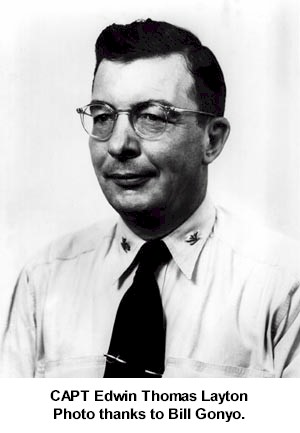
(Eddie Layton’s Captain picture. He appears this morning because of something special that happened last night. Bear with me- and photo thanks to Bill)
All right- this is one of those mornings. It is better than yesterday- that one started with Don-the-Builder’s guys Tom and Jose showing up with the new back door at nine sharp at Refuge Farm, me on a conference call, and spiraled downhill, or uphill, from there.
There were such a dizzying number of things to consider: Burma and Gaza, one OK and the other not; Maryland and Rutgers joining the Big Ten, bringing the count to 14 teams, which doesn’t make any sense, but what the hell. Maybe they will add another six teams and we can have the Big Ten Squared.
I was thinking about Mac as I drove back up north, crunching out of the driveway with two large men ripping the door frame out of the back of the house, and as far as I know, intending to seal it up again before they left. Michigan played Iowa, always a tough game regardless of who was having a decent season, and that was the only time that Mac took a certain pleasure in poking me. He was the complete gentleman, of course, but when his Hawkeyes kicked our butts he was not shy about letting me know.
Anyway, for about the hundredth time I thought I needed to call him up, and the realization that I cannot still leaves me disoriented.
Mac’s family was in town to do the estate sale for the unit he had at The Madison, and I got a kind invitation to go to dinner with them at Willow. I wandered over there after work, where things were at high PRF- pulse repetition frequency- for the big contract kick-off and the uncertainty that is swirling around the Government customer who does not have any more of a clue than the rest of us what is going to happen come this January.
I am sure everything is going to be fine, you know? I was working with Boats on further analysis of the oil-and-gas boom that is going to make everything fine, and will be quite useful as the global temperature cools over the next few decades. It will nice to be warm.
But anyway, Willow was welcoming in the growing dusk and the wine and stories flowed as they always do when Mac’s family is together.

(The selection of wine was fine. Liquor might be quicker, but this was very nice indeed. Photo Socotra).
The table buzzed with conversation, and laughter as always. Mac’s daughter was having the same dis-association issue that I was- thinking I ought to talk to him about something or other, and her habit in that is life-long. Clearing things out from Mac’s apartment and the attic at the house surfaced some interesting things. Between the salad and the entrée, she pulled out an ivory-colored box and handed it to me. There was an object of similarly colored material, and a note yellowed with time along with a card.
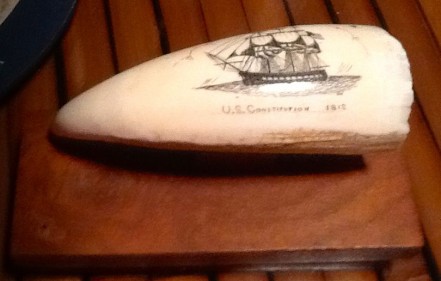 (Scrimshaw, a traditional mariner’s art form. This one was one of four carved by RADM Eddie Layton, and given to Mac by his widow Miriam.)
(Scrimshaw, a traditional mariner’s art form. This one was one of four carved by RADM Eddie Layton, and given to Mac by his widow Miriam.)
Reading her note aloud made me blush, and I am not going to inflict it on you. But the square type-written provenance of the object brings us around to Eddie Layton, Mac’s boss at PACFLT HQ during the war, and one of those historical figures who actually was in a position to change the world, and did.
Here is what his wife Miriam wrote to Mac and his wife Billie long ago, after Eddie passed on and Mac managed to get the Distinguished Service Medal presented to Joe Rochefort, the man responsible for providing the intelligence that stopped the Japanese cold at Midway:
Dear Mac and Billie –
My pleasure and gratitude to you for making it possible for me to be present at the Rochefort ceremony overflows! It was such a great thing to have accomplished.
For all your wonderful help and support I’ve looked around for something of Edwin’s to send you. I know he would applaud this offering, I want it to represent my gratitude and affection for all you have done for me.
A bit of background – the first year Jack Kennedy was in the White House the media announced that Jackie was giving her husband a piece of scrimshaw for Christmas. Not to be outdone, I wrote to a jeweler in New Bedford who made scrimshaw about sending cufflinks for Edwin’s Christmas, He sent me two pairs on approval. Edwin was so delighted with them that we kept them both.
Several years later when we went to New England, we visited the whaling museum in New Bedford where he bought several rough ugly looking whale’s teeth, learned the technique from the Jeweler and a new hobby was launched,
He polished the tooth, drew his picture on thin paper and using a dentist’s scribe incised his design on the tooth and rubbed India Ink into the scratch marks. I feel it would please Edwin to know you have one of the four teeth he decorated with scrimshaw. He had great respect and affection for you too. I enjoyed seeing you and Billie so much.
My only regret was that the time was so brief. Thank you so much for your support and helpfulness over the last two years.
With love,
Miriam Layton
June 8, 1986
Mac typed the following note across the bottom of Miriam’s letter:
(This letter accompanied the Layton-made scrimshaw received on 11 June 1986.)
I was stunned. And that is how Eddie Layton, the fiery intelligence officer that Mac had described to me so many times. I remembered the story he told about the end of the Pacific War- the Japanese had given up, and the victorious Allies were converging on the Sagamai-wan to cement the victory with the signing of the treaty.
Eddie was there, along with the others who had guided the long struggle from Pearl Harbor to Tokyo Bay.
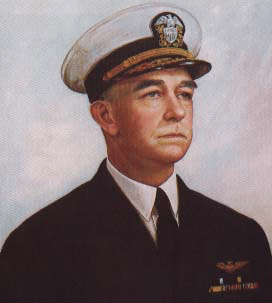
(“Terrible” Turner, a hero and mule-headed naval officer.)
We were at Willow, of course, and I don’t need to remember what Mac said, since I still have the notes on my collection of bar napkins. “Eddie was playing acey-duecy in the wardroom of South Dakota when Admiral Richmond Kelly Turner strode into the space. “Terrible” Turner was in a state of high excitement. He was another of Admiral Nimitz’ personal guests. He executed all the amphibious landings in the Pacific, from Guadalcanal to Iwo Jima, after all. But he was a son-of-a-bitch to his staff, and liked the bottle. Eddie told me he was pretty fired up that evening. He started to shoot his mouth off and the wardroom hushed at the sound of the drunk four star’s booming voice.”
“What was he saying?” I asked.
“He was going off on Admiral Kimmel, of all things, the guy who was left holding the bag for the disaster that Terrible Turner caused by not passing critical radio intelligence to the commanders in Hawaii. According to Eddie, Turner was saying something to the effect that “Goddamned Kimmel had all the information and he didn’t do anything about it. The court of inquiry said so, and they ought to hang him up higher than a kite!”
“But it was Turner himself who did not allow the critical Bomb Plot messages go to Pearl Harbor!” I exclaimed. “He must have known that. The court of inquiry was a white-wash to scapegoat Kimmel.”
“You bet. Eddie sat there, stunned at what he was hearing. He had been there at the beginning before the attack, and then here at the end, the architect of the disaster was shouting that Kimmel ought to be hung up by his fingernails.”
“I guess you can’t do anything against four stars,” I said thoughtfully, trying to imagine the scene in the wardroom of a big gray boat.
“Well, Eddie was pretty fired up, too. He corrected Turner in mid-rant. He told the Admiral that he had been there as Kimmel’s intelligence officer, and he had been there in person.”
“So what happened?”
“Eddie said the Admiral charged across the deck and grabbed him by the throat. Eddie was putting his dukes up to pummel the Admiral when the skipper of South Dakota, Emmet Forrestal, got in between them and broke it up.”
I looked at Mac with amazement. The idea of decking a four-star Admiral made me admire Eddie Layton even more.
Looking over at the white tooth on my table, I have a little piece of something very special, created by the same hands that almost duked out a four-star hero. What an amazing day.
We can talk about that oil-and-gas thing tomorrow. It is going to mean a lot.
Copyright 2012 Vic Socotra
www.vicsocotra.com
